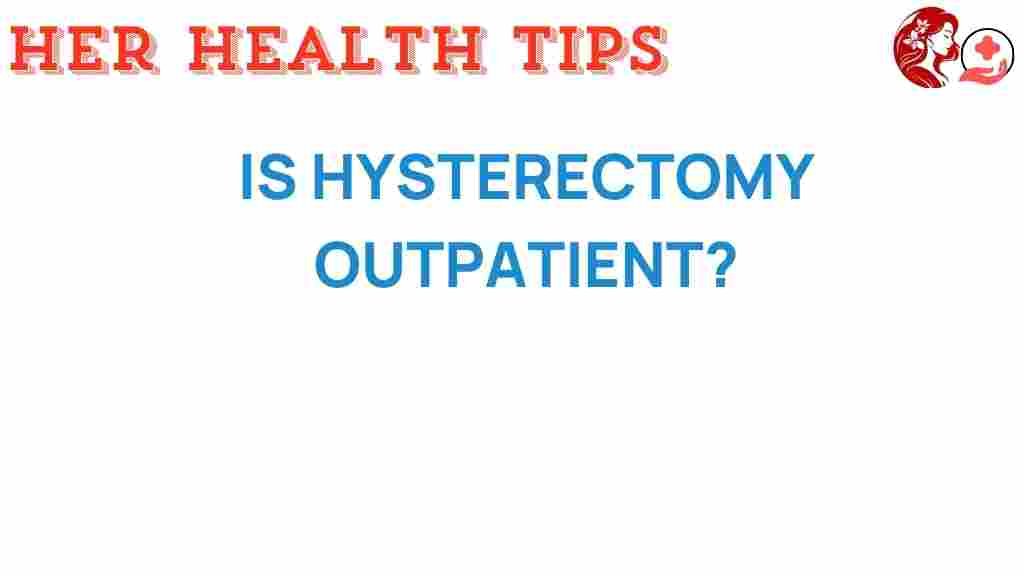Is Hysterectomy Outpatient? Unraveling the Myths and Realities
When it comes to women’s health, few topics evoke as much discussion as hysterectomy. This surgical procedure, which involves the removal of the uterus, is often surrounded by myths and misconceptions. One common question that arises is whether a hysterectomy is considered outpatient surgery. In this article, we will explore the realities of hysterectomy, including types of procedures, recovery, and the implications for women’s health.
Understanding Hysterectomy
A hysterectomy can be a crucial surgical option for many women facing various health issues. It may be performed for reasons such as:
- Uterine fibroids
- Endometriosis
- Uterine prolapse
- Cancer of the uterus, cervix, or ovaries
- Severe pelvic pain
Regardless of the reason, understanding the procedure and its implications is vital for informed decision-making.
Types of Hysterectomy Procedures
There are several types of hysterectomy procedures, each varying in complexity and recovery time:
- Total Hysterectomy: Involves the removal of the uterus and cervix.
- Subtotal (or Partial) Hysterectomy: Only the uterus is removed, leaving the cervix intact.
- Radical Hysterectomy: Involves the removal of the uterus, cervix, surrounding tissues, and sometimes part of the vagina, typically performed in cases of cancer.
Each type of hysterectomy has specific indications and expected outcomes, so it’s essential to consult with a healthcare provider to determine the best option.
Is Hysterectomy Outpatient Surgery?
The classification of a hysterectomy as an outpatient surgery largely depends on the method used for the procedure and the individual patient’s health. Here are the main points to consider:
- Minimally Invasive Techniques: Laparoscopic or robotic-assisted hysterectomies often allow for outpatient surgery. Patients may leave the hospital on the same day as the procedure.
- Open Surgery: Traditional abdominal hysterectomies typically require a longer hospital stay, often necessitating at least one night in the hospital for monitoring.
- Health Factors: Individual health conditions, age, and the presence of complications can influence whether a hysterectomy can be performed as an outpatient procedure.
It’s crucial to discuss these aspects with your surgeon to understand what to expect based on your circumstances.
The Recovery Process After Hysterectomy
Recovery from a hysterectomy varies based on the type of procedure and the individual. Here’s what you can generally expect:
- Initial Recovery: Patients may feel tired and experience pain or discomfort post-surgery. Pain management is typically provided through medications.
- Activity Level: Light activities can usually be resumed within a few days, but heavy lifting and strenuous exercise should be avoided for several weeks.
- Follow-Up Care: Regular follow-up appointments with your healthcare provider are essential to monitor healing and address any concerns.
Patients are encouraged to listen to their bodies and consult their doctors if they encounter any unexpected symptoms during recovery.
Common Myths Surrounding Hysterectomy
Numerous myths surround hysterectomies, which can lead to fear and misinformation. Here are some of the most common myths debunked:
- Myth 1: Hysterectomy means infertility.
Truth: A hysterectomy removes the uterus, making future pregnancies impossible, but it does not affect the ovaries, which produce eggs. - Myth 2: All hysterectomies are major surgeries.
Truth: Many hysterectomies can be performed laparoscopically, reducing recovery time. - Myth 3: Hysterectomy is the only treatment for women’s health issues.
Truth: There are various treatment options available depending on the condition, including medication and less invasive procedures.
Understanding the truths behind these myths can help women make informed decisions about their health.
Choosing the Right Surgery Options
When considering a hysterectomy, it’s essential to explore all available surgery options. Here are some factors to keep in mind:
- Consultation: Schedule a detailed consultation with a gynecologist to discuss symptoms, treatment options, and the potential need for surgery.
- Second Opinions: Don’t hesitate to seek a second opinion to ensure that a hysterectomy is the best choice for your situation.
- Understanding Alternatives: Ask about alternative treatments that may be available, such as hormonal therapies or other surgical options.
Making an informed choice is crucial for long-term health and well-being.
Post-Surgery Troubleshooting Tips
After undergoing a hysterectomy, it’s essential to be aware of potential complications and how to address them. Here are some tips:
- Monitor Pain Levels: Use prescribed pain medications as needed, and communicate with your doctor if pain worsens.
- Watch for Signs of Infection: Symptoms such as fever, excessive bleeding, or foul-smelling discharge should be reported immediately.
- Stay Hydrated and Nourished: Proper nutrition can aid in recovery; focus on a balanced diet rich in vitamins and minerals.
By taking these precautions, patients can facilitate a smoother recovery process.
Conclusion
In summary, whether a hysterectomy is classified as outpatient surgery depends on various factors, including the surgical technique used and the patient’s health. This procedure can be a vital aspect of women’s health, addressing significant medical issues. By debunking myths and understanding the realities of hysterectomy, women can make informed decisions about their health care.
If you are considering a hysterectomy or want to learn more about your options, consult your healthcare provider. For more information on women’s health topics, visit WomensHealth.gov.
Remember, your health is your priority, and understanding your options is the first step towards making the best decisions for your well-being.
This article is in the category Reproductive and created by HerHealthTips Team
